You’re listening to Burnt Toast! This is the podcast about anti-fat bias, diet culture, parenting and health. I’m Virginia Sole Smith.
Today I am chatting about body autonomy, diet culture, and chronic health conditions, with Leigh Kamping-Carder, who writes .
The Heart Dialogues is a newsletter for people with congenital heart conditions and the people who care about them. Leigh was born with a complex heart defect called tricuspid atresia and had three heart surgeries before she was four years old. She is also an award winning journalist. As a lot of you know, I’m a mom to a 10-year-old with a heart condition very similar to Leigh’s, so I’ve been following Leigh’s Substack for a while because she explores so many questions that we’re also navigating. Like, why not everybody with this diagnosis wants to be known as a “heart warrior.” Or how to advocate for yourself at doctors’ offices. And how living with a chronic condition impacts your relationship to your body in ways you’ve maybe never considered. Diet culture and anti-fatness show up, often quite reflexively, in even this kind of super specialized healthcare.
There is a lot here and I do want to throw in a quick content warning: If you are currently navigating a super fraught medical situation for yourself or with a loved one, today’s episode may not be for you. I know there are times when I am personally ravenous for this kind of conversation and times when I just can’t go there. So please take care of yourself.
If you’re enjoying the podcast, make sure you’re following us (it’s free!) in your podcast player! We’re on Apple Podcasts, Spotify, Stitcher, and Pocket Casts! And while you’re there, please leave us a rating or review. (We like 5 stars!)
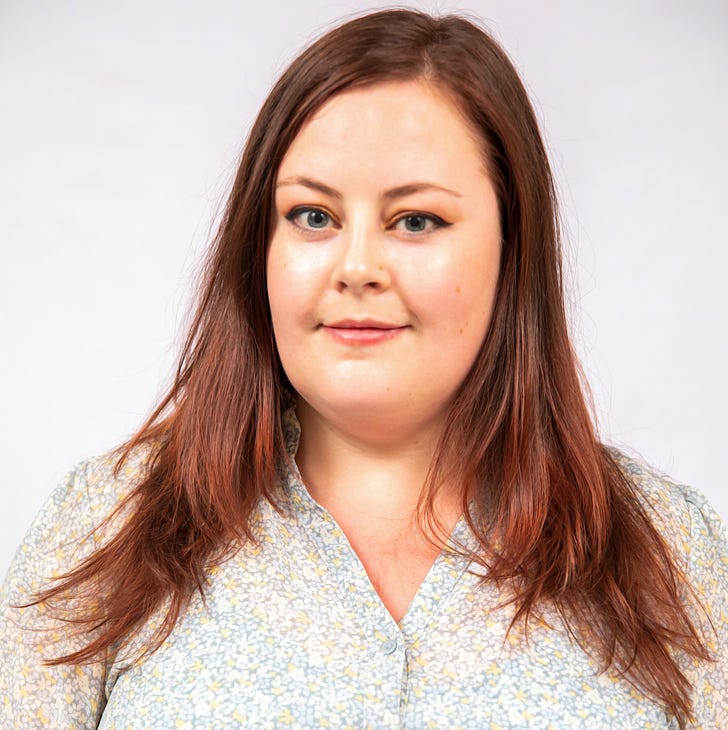
Episode 118 Transcript
Leigh
My name is Leigh Kamping-Carder and I’m the writer of
newsletter on Substack, which is a newsletter for people who have congenital heart disease, which means they were born with some kind of complication with their heart.
I was born with a heart defect called tricuspid atresia, which means that the tricuspid valve, one of the valves in your heart, doesn’t form. As a result, I only have one ventricle, which is the main pumping chambers in the heart, instead of two. So I had several surgeries when I was like a little kid, and mostly lived a normal life. Then I think in the last few years I started to really realize that this is kind of a lifelong issue and more things can crop up as you get older.
Congenital heart defects are actually the most common birth defect in the US. They affect roughly 1 in 100 babies. What’s been really incredible over the last few decades, is that, medical advances have allowed people to really live into adulthood and even old age. The flipside of that is that we’re realizing more and more that this is something that does affect people for their whole lives. There’s actually about 2.5 million people in the US who have congenital heart defects and the majority of them are adults.
Virginia
Oh wow, that’s a big change.
Leigh
Yeah. It’s really something that for centuries was a death sentence, and then, was something that affected children. And now it’s this sort of prevalent thing, yet it’s also not talked about. There’s no fundraising run like there is for like cancer or Alzheimer’s or something like that. Which, not that it’s a competition or anything. But you probably know someone with a congenital heart defect, and yet you probably don’t know that you know someone.
So what this means is that you can live your whole life without ever meeting anyone like you. That was certainly my experience. I didn’t meet anyone else with a heart defect until I was well into adulthood. I didn’t have friendships with anyone until I was in my mid-30s.
In parallel to that, I live this normal life. I grew up in Toronto, Canada, I moved to New York, I became a journalist, and kind of got to this point where I was like, “I want to create a community.” And I thought, hey, I have skills. I’ve been reporting and editing and launching newsletters and doing all these things in my professional life. So I thought that was a way to create this community for people, and hopefully help people who have grown up with congenital heart defects, but also their parents and families and medical providers and their friends.
Virginia
For listeners who don’t know: This is a subject that means a lot to me personally because my older daughter lives with a complex congenital heart condition. She’s 10. From when she was a baby through about age three, we were in the intensive, active management of her condition going through multiple surgeries. I’ve talked about this before. But we have for the past few years lived this, quote, normal life with her. She’s in school, she’s doing great, she’s thriving. And yet, her condition is lifelong. It is something that we will be managing—we meaning me for as long as she lets me be involved in her medical care. At some point she’s gonna take over.
Leigh
That’s a good thing!
Virginia
I know, I know. The whole mother-daughter hand off of that is something else we’ll unpack later with my therapist. But this is something she’ll be managing her whole life. So I think a lot, as we’re getting into the tween years and the teen years are not too far away, about these questions you’re raising of community. We don’t know other kids with her specific heart condition. We don’t even currently know any other kids with any heart conditions. So that’s the community she doesn’t have right now. I can only imagine as you get into the teenage years and then into adulthood, how much more important that community might feel. So I just really love that you are doing this.
Leigh
Thank you. I do get responses from readers along those lines where they feel heard they feel seen. It’s really gratifying.
Virginia
Another piece of this that I think a lot about as the mom, especially of a daughter with CHD, but certainly all genders this would apply to, is how this experience of living with a chronic condition impacts your relationship with your body. This is a complicated one. There’s not only the standard diet culture messaging that all kids, and all of us, are bombarded with. But we also live in a very ableist healthist culture that’s bombarding you with a lot of messaging.
Leigh
As a kid, it wasn’t something that came up too much. I mean, I was really lucky to survive these surgeries and to really be doing all right. I didn’t have limitations on physical activity and things like that. But certainly as I got to be your daughter’s age and a teenager, I think I really felt like my body was a failure. I think that’s something that a lot of kids have. But for me, it was this feeling of, “I can’t run as fast or as far as people.” No matter what I did, my body didn’t work as well as other people’s.
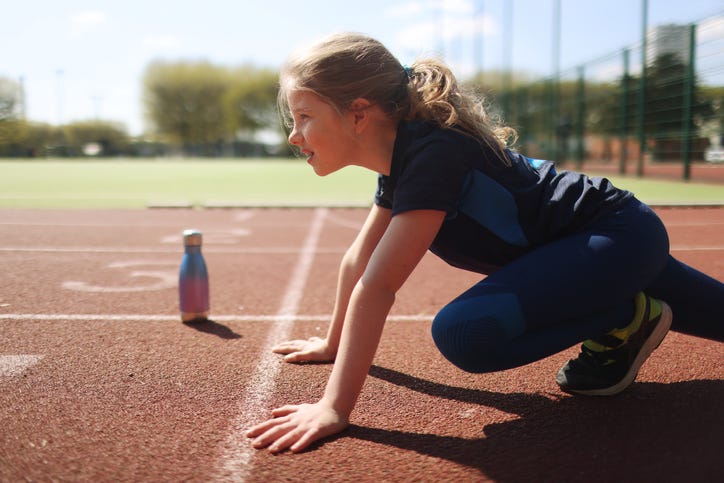
And I don’t think there was ever anyone who sat me down and said, “That’s okay. You have a heart that’s really complicated. Your heart is not like other people’s hearts. And it’s okay.” But also, no one sat me down and said, “Hey, even if you didn’t have a complicated heart, it’s okay.” You can move for the love of it, you don’t have to get on the treadmill and hit a certain minute or mileage or calorie count or whatever.
Virginia
Movement isn’t something we have to be the the best at.
Leigh
I think that really underscored how I thought about my body was just, it was a failure. Which is so sad for me to say now, and I don’t feel that way now. But I think the remedy I found to counteract that was, “Okay, if my body can’t work the way everyone else’s bodies work, it can at least be skinny.” I spent many years deep in diet culture, disordered eating, what was eventually diagnosed as an eating disorder. I mean, obviously, it was informed by everything in our culture, and my family which was very focused on everyone being thin. So all of that. But a big piece of it was: My body doesn’t work like other people’s, but I can find some sort of greatness in my body if it’s skinny, if it looks good, if it’s hot.
Virginia
Was control a part of it too? Because I mean, just as a parent, I have struggled with this idea that we live with this thing that happened beyond all of our control. I wonder if that also would then play into it. Like, if I can’t control that, can I control my weight?
Leigh
There were many moments when I was growing up where I didn’t have control over my body in just a very literal sense. Every year I would go for tests at the hospital, echocardiograms or ultrasounds of the heart. You know, lying on a bed with my shirt open as a 13-year-old and having a stranger rub jelly on me. And of course, no one says, “That’s a problem,” because they’re medical professionals and they saved your life. And you have to do it. But I do think I have a sense of my body where I kind of want to protect it and be able to kind of have agency over it.
Virginia
For anyone who’s watched a kid go through any kind of intensive medical experience, there are so many moments where a child’s body autonomy is violated. It is, as you’re saying, medically necessary. And I think our medical system could do a much better job navigating that.
We always fight to give her whatever control we can, even if it’s just choosing which arm the blood pressure cuff goes on, or which finger they put the pulse ox on. Any sense of control she’s allowed to have I tried to give her in those moments. A big one we always tell them is, “She’s going to take the EKG stickers off herself.” Because it doesn’t feel good when someone’s ripping stickers off your body. And if she does it herself, she has this full system of how she takes them off. It makes her feel more in control of it. But you’re right. So much of that process is just having no control over what’s happening to your body.
Leigh
You’re absolutely right that there’s so much more to do. And at the same time, I think it has gotten a lot better.
Virginia
I can only imagine how incredibly terrible it was.
Leigh
This is not to say anything negative about my individual nurses or cardiologists, many of whom were and are wonderful and caring and lovely. But there are so many pieces about having a lifelong medical issue that aren’t about pain, they’re about other things. I think people are really focused on “Oh, don’t worry, it’s not going to hurt,” and that if it doesn’t hurt, then it’s okay. But I think for me, the things that physically hurt were actually less uncomfortable than the things where I felt like, “I don’t have autonomy. People are treating me not like a human being, like an object.”
And I think those are lower on the list of priorities for medical personnel. Understandably, right? You want to make sure that the patient isn’t in pain. But I think it’s also important to recognize that there are little things that can really help make people feel like they aren’t a piece of meat.
Virginia
Absolutely. Just to give listeners some further context: It is only shockingly recently that pain management has become as big of a focus as it is in pediatric care. There’s this weird history where doctors thought babies didn’t really experience pain. So they didn’t worry about it, which is truly horrific to contemplate. And that has been a big shift. But you’re absolutely right, this goes so far beyond pain.
I can remember so many nurses saying to us in the hospital in those early years, “Well, don’t worry, she’ll never remember any of this.” At the time I was like, “I think that’s what you tell yourself to do this job.” I don’t think that’s necessarily true for these kids. I think that’s what you tell yourself to feel better about how much you have to manipulate a kid’s body and take away their autonomy in order to do this. But a better way would be for us to be thinking about how we maintain more of that autonomy while doing these necessary things.
[Virginia note: For a deep dive into how intense medical experiences impact children and what recovery can look like, I love this book.]
Leigh
Yeah, absolutely. There’s a lot that I don’t remember from those surgeries, just because I was so young but it absolutely affected me. And and I think there would have been ways to make those experiences better.
Virginia
Yeah, I think there’s like the literal, okay, they won’t remember this particular blood draw, fine. But is this shaping their understanding of their body and their felt safety in the world?
Leigh
Is this giving them a lifelong phobia of needles?
Virginia
Is it going to be surprising to be unpacking this 10 years later? Really not. And I think that’s another layer that many medical professionals still don’t want to look too closely at, because they’re constrained by the way their job has to get done, and the way the whole system is. If they had to look at that, they wouldn’t know how to get from point A to point B, maybe.
Leigh
I do think that these days, the cardiology care I get is much more sensitive about those things. Nurses ask me how I’m doing, they tell me what they’re going to do before they do it. I typically say that I don’t want to get weighed and I’ve never gotten pushback on that.
Virginia
That’s amazing. In a cardiology setting, particularly.
Leigh
I don’t know what it’s like in the pediatric centers these days. But certainly the adult care I’ve experienced is remarkably different from when I was a kid.
Virginia
Well that is encouraging. And I don’t want to scare folks who are maybe somewhere in the pediatric process, I think there is progress being made. When I have advocated for a different approach, we usually get it—it’s just not necessarily the starting point. This is evolving sort of across the board in pediatrics. It’s amazing how many people will come in to do something to your kid and not introduce themselves to the child. The simple thing of me being like, “Hi, what’s your name? Oh, great. This is…” and introducing my child. Like, let’s just like look at each other like people.
So there are definitely small things parents can do to improve that dynamic. But then I think the other thing is being aware that this does have a long tail, and that this does impact kids’ relationships with their bodies in all sorts of ways you can’t predict. And so it’s important to have a plan for therapy or support as they navigate that in subsequent years.
Leigh
Yeah, absolutely. I think that’s really important.
Virginia
I’m curious about that timeline for you. You had your surgeries were when you were a little kid. And when did you sort of start struggling with what became your eating disorder?
Leigh
When I was 15 or 16.
Virginia
So it was like a decade later?
Leigh
That’s when it comes up for a lot of kids. I will say that I didn’t ever think of it as an eating disorder until 2019, when I was actually formally diagnosed.
Virginia
Oh wow.
Leigh
I think it ebbed and flowed. It wasn’t a continuous kind of thing. But it was a long time. Many years.
Virginia
One thing we know about eating disorders is that they can put a lot of strain on people’s hearts. So I don’t know if there’s any piece of that you want to speak to in terms of managing eating disorder treatment and managing your heart health?
Leigh
Well, I did not tell anyone about it until, honestly, like the last couple of years of my life. And I’m 39 now, so you can do the math.
Virginia
You’ve been going through it for a long time.
Leigh
Honestly, I wish I had a better answer. But I don’t think that for congenital heart disease, there is really any research into eating disorders. I know that in the last decade or so there has been more research on other mental health conditions, you know, anxiety, depression, PTSD, but that’s really just starting. I would love someone to prove me wrong and send me the link to this, but I’ve never seen a study in terms of how many people with CHD have eating disorders. I think it’s something that hasn’t been studied yet.
Virginia
That would be super fascinating to understand. It feels so important to look at that relationship more closely and look at how these early experiences and medical trauma, chronic experience throughout childhood, the medical monitoring and all of that. And, as you started us out with, the experience of feeling like your body doesn’t “work.” All of that just feels like a perfect storm.
Leigh
I mean. I am not the only person I know in their 30s with CHD with an eating disorder history.
Virginia
I’m sure not. When you did get treatment for your eating disorder, did you find folks who could talk about this piece of it with you? Or did you have to navigate it as two unrelated things, even though they’re obviously related?
Leigh
I was really lucky to find a great fat liberation therapist and that’s how I how I fell into this rabbit hole. I think she’s been great with the medical trauma and chronic illness pieces, but I think part of it also was me a little bit educating her about the idea of CHD, and what that is, and what it looks like.
Virginia
Yeah, and how it can continue to impact you. That makes sense.
Leigh
And then I’m also educating my cardiologists. I mean, when I finally came out to them, I wound up sending a letter to my cardiologist and my electrophysiologist, who specializes in the electrical circuits of the heart. Because I was getting arrhythmias and weight loss is one of the recommendations. So I had to send a letter that very calmly spelled out: You can’t recommend weight loss. I’m not going to do it.
They were great. Like, I want to say, again, my cardiology team is fantastic. My cardiologist called me and I think was a little like, wow, I don’t know what to do with this.
Virginia
“Now I have to talk about feelings and that’s not my normal thing!”
Leigh
Right. But was very understanding. It was very much like, we want you to take an active role in your health and your heart and we want to hear about this. So he was supportive.
Virginia
That’s really encouraging to hear, and not necessarily what I would have predicted.
Leigh
I know. At every stage I’m actually pleasantly surprised that they’ve been receptive. But I am I would say, a small fat, or maybe not even that. I’m white. I’m able-bodied. So I’ve got a lot of privilege. I don’t know what it would be like for someone else.
Virginia
Can we talk a little more about the experience of feeling like your body doesn’t work? Because I think here on this podcast, we talk about diet culture a lot. But I think we’re only starting to really grapple with how to talk about healthism, and ableism.
Leigh
When I was younger, I was always encouraged to exercise. So I think for me and perhaps other people like me, it felt like I could never do enough. Like, I could never be healthy enough. And that anything I did do didn’t count unless it was to the nth degree.
But there are a lot of people in my generation who grew up with CHDs and were told they should never exercise. So I think for that population of people who were told that they couldn’t exercise, it was very much like, “Wait, now that guidance has changed.” And then there’s a lot of anxiety around any kind of movement.
Another thing I hear in interviewing people with CHD is they tell me that one of the things that causes them stress when they go to the cardiologist or to to any doctor, really, is the worry that people will think that they have acquired heart disease. Now that they’re old enough that potentially they could be someone with acquired heart disease. People want to tell the nurse like, “No, no, this isn’t my fault. I was born with this. You know, I don’t smoke. I don’t eat cheeseburgers. Like, this isn’t my fault.”
I mean, first of all, it causes them stress about that. But I think what’s unspoken in that is that it is the fault of those other people who eat cheeseburgers. Which, you know, I think it goes without saying that health is made up of many, many different things. We don’t know all the reasons why people get heart disease as adults.
Virginia
Genetics still plays a role.
Leigh
Yeah, and environment. So I think there’s there’s a lot of healthism still embedded in how people think of their hearts and their bodies. You know, like, “I’m not that person.”
Virginia
It’s similar to the different stigmas around Type One and Type Two Diabetes, right? Type One, it happened to you when you were a kid, it wasn’t your fault. And Type Two is like, “Well, what did you do?” And in both cases, such an unhelpful and unfairly biased way of approaching health.
It is weird that there’s this big division between congenital and acquired in the adult space. I mean, it makes sense when you drill down into the specifics of treatments, probably, but there should be more allyship between these communities.
Leigh
Well, I think it’s very new to have a big group of adults. There’s just historically been groups that raise money or awareness or research heart disease, and typically, they don’t devote a lot of time or resources to congenital heart disease, adults with congenital heart disease.
Virginia
Yeah, that’s a complicating factor, too. “Well, we’re getting ignored. And it’s all these people who brought it on themselves getting all the research dollars,.” It’s unhelpful narrative when, we really need more research dollars. But we could do that without stigmatizing people.
On the exercise stuff, too—that’s so fascinating. I mean, we definitely get the message of “Oh, she should be as active as she can.” More active active, active, active. So good to be active, we definitely hear it. But I have encountered some of that more “Oh, they can’t do anything,” like the “keep them in a glass box” approach to congenital heart conditions, often from older folks. That’s the assumption of “Oh, she must not be able to play any sports.” I’m like, well, she doesn’t play sports, but that’s because we don’t like sports as a family.
Leigh
That sounds very familiar.
Virginia
I don’t want to spend my Saturdays at travel soccer games and she has zero interest.
But it is also a real thing, right? That when she does do stuff in gym class or just whenever, there can be limitations that she has that other kids don’t have. So then I get very in my head about, “I want to encourage you to listen to your body. I want you to rest when you need rest.” I’m always advocating on that side of things but then I’m also aware of —I don’t want you to feel like there’s all these limits around you. Like, if you want to push yourself, go for it. That’s amazing. I know there are benefits to that.
Do you have any thoughts on navigating that balance? I guess now I’m asking you for parenting advice.
Leigh
I really wish I had a good answer to that. I don’t know. I mean, I can tell you that my experience was kind of the opposite. I was treated so much like a normal kid that we didn’t even really talk about me having a heart issue. I think there definitely could have been space to talk about it more, and to not feel like it was this scary unspoken thing.
But also, there are people who really grew up thinking that they were fragile, that there were lots of things they couldn’t do. Like, God forbid you would travel or even live in your own apartment or all that kind of stuff. That’s the other end of the extreme and that’s not good either. It sounds like you’re kind of navigating the middle of it.
Virginia
I’d love to talk about scars a little bit. That’s also such a big piece of the CHD body puzzle. My understanding of this is that there used to be a really big stigma around the scars. And certainly in the last 10 years that I’ve been parenting a kid with a heart condition, all of the social media talk I see is very much like “Celebrate your scars, they are your warrior stripes!” There are these campaigns where kids show off their scars. And I think that’s great to make them a positive thing, of course, and embrace them. But I’m betting it feels a lot more nuanced when it’s your body and your scars.
Leigh
I think that campaign might be more confined to kids with CHD. My experience was that when I was a kid, I didn’t really think about my scar. I think everyone that I was interacting with knew me, they knew my history, they knew that it was there. I stopped seeing it, they stopped seeing it, it was fine.
Then I think as I got older, particularly into teenage years, and then definitely when I was in my 20s and I was going to college or traveling or just meeting new people and dating, especially, was when it would come up. Because you would meet someone and for me, I would think, Oh my god, the first thing that they’re going to see is my scar, and the only thing they’re going to look at is my scar, and I have to explain what is this thing on my body? I have to explain my body to them. So it was really on my mind.
I think there are some people who do see it as a badge of honor or that kind of thing. There’s scar pride and whatever. And then I think there’s lots of people who don’t really think about it that much. And then I think there’s also people who, you know, do still feel really sensitive about it, particularly if you’re a woman. Maybe you wear turtlenecks or or that kind of thing,
Virginia
Yeah, and just for folks who don’t know: That’s because the most common scar to have from heart surgeries they call a zipper scar, and it runs basically really right down into your cleavage.
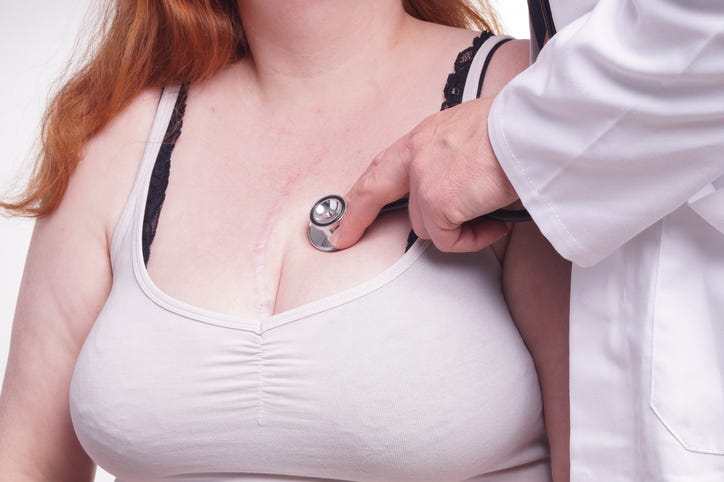
Leigh
Right. I never know: Is someone staring at my scar or my cleavage? Like, what’s going on?
Virginia
It’s an added thing to navigate.
Leigh
I think for me, I would always rather people just ask about it. I can tell you and I don’t mind talking about it and then we never have to talk about it again. It’s not a thing. But no one does that. And I also understand why they don’t ask about it because, you know, it’s personal.
Virginia
And do you want to spend your life explaining your body to people? That could get old, too.
Leigh
If they’re going to look at it, or very obviously stop themselves from looking at it, then I would rather just get it out in the open.
Virginia
Yes, let’s just have the conversation.
Leigh
The best would be: They just don’t care about it.
But I will say it’s interesting because I interviewed a model a few months ago who had open heart surgery when she was I think 10 or 11 months old, and she has a zipper scar. And she told me about how she’d been in campaigns and the photo director or the photographer would automatically Photoshop out the scar. And I do think that’s something, when we’re talking about body positivity that I very rarely see models or even actors or anyone with scars.
Padma Lakshmi is sort of the one example, which is not a zipper scar. It’s on her arm. But, because you can really easily get rid of a scar on screen, people do. People would do it without asking her and she would actually have to ask them to keep it in.
Virginia
That’s so violating.
Leigh
Because the assumption is, “Of course you don’t want people to see your scar.”
Virginia
I can remember before my daughter had her first surgery at one month old, I can remember looking at her without her scar and feeling really emotional about her body at that point and thinking, “Your whole rest of your life, there’s going to be the scar.” It’s going to look different. And that felt like something I had to mourn at the time. And now that feels wild to me, because her scars are just part of her body and part of her story. I can’t imagine her without them. So this assumption that of course, you would want that gone—I find pretty offensive.
Leigh
Right and I think that’s another difference for people with CHD. For many of them, they had their surgeries as really little kids. For me, I can’t remember a time when I didn’t have a scar. If I ever see a photo of myself from when I was a kid, like a really little kid—I mean, I had the open heart surgery when I was almost four, so I already had scars as a really little kid. I can’t imagine not having it. And I think that’s different for someone who had heart surgery as a 45-year-old. It feels very alien to them.
Virginia
That maybe feels now feels like this body that you’ve known is different in this profound way. Whereas these scars are scars that have been part of people’s bodies, their whole lives more or less. Either way, it’s this resistance to the idea that bodies can change and evolve and not be perfect.
Leigh
I mean, even my scar looked very different when I was a kid versus now. You know, it fades and shrinks.
Virginia
Are there any other ways you see diet culture and anti-fatness showing up more generally in the heart community? We talked a little bit about the congenital versus acquired debate, but I’m curious if there are any other pieces of this?
Leigh
I think there’s just a lot of pressure on people with congenital heart disease to be healthy, to be thin, to exercise, to eat the right diet. One diet that people often get prescribed as a low sodium diet, which is an elimination diet that is not as sexy as gluten-free or cutting out carbs.
Virginia
Not so trendy anymore but it definitely still involves a lot of eliminating.
Leigh
Yeah. I think it’s just that added pressure. I think this is probably true for anyone with serious medical issue or chronic illness that you really feel like if I don’t do all these things and then something happens, it’s my fault. Because I didn’t check all the boxes. I didn’t make as much effort as I could make.
Virginia
Oh, God. I mean, I have an essay I’ll link to that I wrote about having to let go of that in terms of my guilt as her mom. Forgiving my own body and myself because I thought I, somehow in my pregnancy, must have not done everything perfectly and resulted in this. It breaks my heart to think about people growing up with these conditions and feeling that same way. That you still have to get an A+ in managing your chronic condition is just, I mean… that test is never going to be over. You’re never going to get the A+.
Leigh
I think it goes back to the idea of what healthy is, right? We talk about healthy often as this dichotomy with being unhealthy. If you’re unhealthy, it’s this sort of temporary place where you’re going to snap into being healthy at some point. For me, it’s never been like that. For many, many people it’s not like that.
And when we say the word “healthy,” the assumption often is a healthy diet, whatever that is, no fat or carbs, or sugar, and healthy weight, meaning thin. All the other aspects of health are so rarely part of it. I think it’s true for the CHD community, but for everyone. But healthy can be getting a good sleep, it can be spending time with your friends, it can be getting outdoors. There are so many ways to be healthy. And I think definitely within CHD and across the board, there’s so much focus on diet and exercise in this really narrow way.
Virginia
Yeah, that makes sense. It’s depressing, but it makes sense. Again, I think it ties back to everything you were talking about in terms of what contributed to your eating disorder, of feeling like you need to get some part of this right, that you need to feel some sense of control over your body. If you can achieve health in this very narrow, narrow definition of it, somehow you’re balancing some scale or something.
Leigh
Or they they can’t come and get me, if something goes wrong. Like, you have a clean conscience if you wind up, I don’t know, getting an arrhythmia. It’s not your fault. I mean, that’s not how it works.
Virginia
It’s not how it works. It just shows more broadly, how much work we have to do to untangle health and morality in this country in this culture. We have so defined health as a matter of if you have willpower and if you follow these certain rules, then you can achieve it. Which is utterly false. You would think no one would know that better than folks with congenital conditions, and yet, they’re operating under the same set of pressures—even more so it sounds like. It’s really tough.
Butter
Leigh
So my Butter is the podcast called Heavyweight.
Virginia
Oooh, I don’t know this.
Leigh
Despite the name, it’s actually not about fat liberation.
Virginia
Ha, I was getting hopeful. Okay, that’s fine.
Leigh
Sorry. Sorry. It’s a podcast by Jonathan Goldstein, a longtime Canadian radio guy. And it’s about going back to those moments in our lives that we regret, where we could have done something different, or we wish we’d done something different. And he interviews people, and thenfinds those people from way back in their lives that they’ve done wrong.
Virginia
Oh, wow.
Leigh
Someone who they had a weird interaction with, so that they can actually talk to them. And he’s just so like, funny, and melancholic, and neurotic, and just like, such a great voice.
Virginia
That sounds so good.
Leigh
They’re in the middle of putting together the eighth season. So it’s sort of on hiatus right now, but if you haven’t heard of it, go binge them.
Virginia
That sounds so good. And I’m just cringing at the thought of finding people in my past like, oh god, sounds terrible. But I mean, also really good listening.
My Butter, I thought in honor of since we’re talking about CHD, I would think of something related to my kiddo. And the really fun thing we’ve been doing lately that has absolutely nothing to do with her heart. Because it’s also great to emphasize that people with heart conditions are many more things than that.
Leigh
Absolutely.
Virginia
We have been watching The Good Place together I watched it when it first came out, but she’s 10 now, and such a smart, funny kid. So it’s been fun to start finding shows where, this is fun for us to watch together. It’s not a kid show anymore, but it’s not like wildly over your head or just upsetting in terms of like too much sex and violence and that kind of stuff. I would love commenters to drop it in the comments if you have other show suggestions for us! (I will say, we don’t do reality TV, so don’t suggest baking shows. I’m glad you all love them. It’s not my jam.)
But we just did The Good Place and it was a delight. It’s a great show to watch with a 10-year-old because 10-year-olds are very sure they’re right about everything, and really ready to start like honing their adult argument skills. And so all of the philosophical debates they have in that show are fun to watch a 10-year-old digest and consider her own take on. Like, who’s good and bad and what it means to be in the good place or in a bad place.
Leigh
And it is this whole like universe. I won’t spoil anything. But there’s an ending.
Virginia
There’s a very satisfying ending. I let her stay up pretty late to finish it one night because I was like, “Okay, we’ve got to see this. We’re in this now.” But it’s a great jumping off point for talking about religion, and what happens when we die, and just all sorts of wacky topics.
Leigh, this was wonderful. Thank you so much for bringing this conversation to Burnt Toast. It’s obviously an issue I think about a lot. And I think folks are gonna get so much out of this. So really appreciate you being here. Why don’t you tell folks how we can follow you and how we can support your work.
Leigh
Yeah, well, thank you so much for having me. It’s so great to get this out to an audience of people who aren’t already part of this community, so thank you.
You can subscribe to my newsletter at The Heart Dialoguesand you can follow me on Twitter or X or whatever it’s called. I’m at Leigh_KC. I don’t do a lot of social media.
Virginia
Good for you. I support that fully.
The Burnt Toast Podcast is produced and hosted by me, Virginia Sole-Smith. You can follow me on Instagram.
Burnt Toast transcripts and essays are edited and formatted by Corinne Fay, who runs @SellTradePlus, an Instagram account where you can buy and sell plus size clothing.
The Burnt Toast logo is by Deanna Lowe.
Our theme music is by Jeff Bailey and Chris Maxwell.
Tommy Harron is our audio engineer.
Thanks for listening and for supporting independent anti diet journalism!











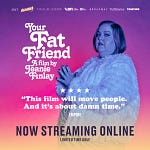
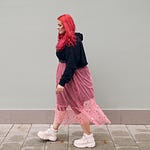

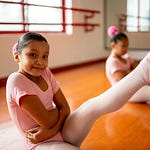
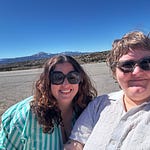


"It Felt Like I Could Never Be Healthy Enough."